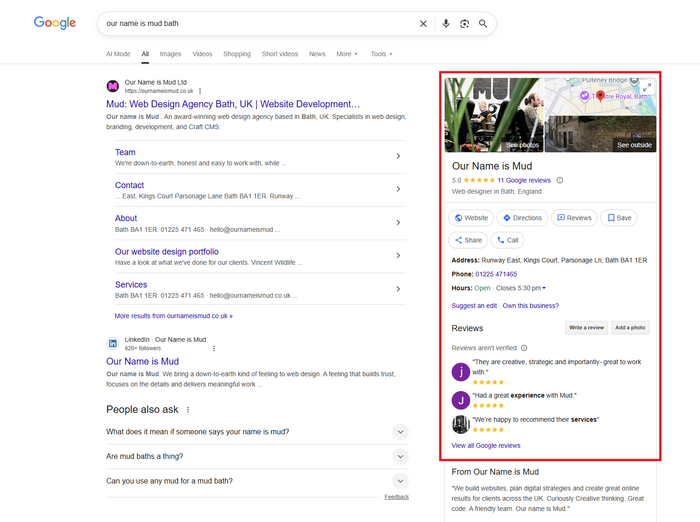The Role of Schema Markup in SEO & AI Search (2026 Update)
From the Journal – Posted 20.11.2025

Schema markup has been around since 2011. So, why in 2026 is everyone suddenly talking about this relatively benign vocabulary of structured data?
The difficulty with schema is that it’s a practical tactic that operates smoothly in the background. Once the novelty wears off, it’s easy to overlook.
The truth is that schema markup never became unessential. But with the rise of AI Search, this structured data, which tells search engines what your content is, not just what it says, is back in the spotlight.
Schema’s New Importance: AI Overviews
For years, the primary use of schema markup was to unlock rich snippets (still relevant for SEO, by the way), those extra details provided in Google search results, like star ratings, price, product info, etc.
But schema markup has found a second life in AI Search. It’s a foundational tool that helps LLMs - via search engines - better understand the context of what they’re looking at.
Nick Livermore, Marketing Manager"So much of the internet is focused on the intricacies of AI search. But we're just at the beginning of that journey. If you want to focus on something that will absolutely have an impact, then revisit your schema, you'll probably find someone forgot about getting it right a while ago..."
On the face of it, the search landscape is almost unrecognisable when compared to 2011. It’s more conversational. More about being understood.
But, look under the bonnet, and you soon realise that it’s all built on broadly the same objective: understanding user intent and returning the most useful information possible.
And yet, structured data remains the most direct way to speak to machines. It’s how you give robots and crawlers context, not just content.
💡 Further reading: How to Optimise Your Website for AI Search
Quick Refresher: What is Schema Markup?
But let’s not get ahead of ourselves. What is schema markup?
Schema markup is structured data added to a webpage’s HTML (usually written in JSON-LD) that helps search engines understand exactly what they’re looking at, which in turn supports AI search and LLM results.
There are hundreds of schema types and over 800 vocabulary terms in total, but some of the most common help search engines understand things like…
- Product information: price, availability, reviews
- Business information: address, phone numbers, opening hours
- Event information: date, time, location
- FAQs
- Articles and blog content
Tools like Google’s Rich Results Test or the Schema.org validator help ensure your markup is clean and interpretable. Incidentally, for a full list of available schema markup, head over to schema.org for a comprehensive community-supported repository.
An example of WebSite Markup:
{
"@context": "https://schema.org",
"@type": "WebSite",
"name": "Our Name is Mud",
"url": "https://ournameismud.co.uk/",
"potentialAction": {
"@type": "SearchAction",
"target": "https://ournameismud.co.uk/?s={search_term_string}",
"query-input": "required name=search_term_string"
}
}This tells search engines (then used by LLMs):
- The site is called Our Name is Mud
- The homepage is ournameismud.co.uk
- Users can search the site using a built-in search bar
Adding this helps search engines understand your site as a whole entity, improving its representation in search results.
💡 Further reading: Web Design & SEO: Building a Website that Ranks in 2026
Does Schema Matter for SEO in 2026?
The internet would have you believe SEO is dead. It’s not. And if you strip away the hype surrounding AI and LLMs, you realise that the machines crawling your website still benefit from a little guidance.
Schema remains the most reliable way to provide that assistance. And in 2026, schema’s relevance comes down to 3 core dimensions: understanding, visibility, and trust.
Understanding
Schema gives search engines and AI systems the context they can’t safely assume on their own. It clarifies entities, relationships, and meanings; the raw ingredients behind AI Overviews and entity-based search.
When you mark up a page with Article, Product, or LocalBusiness, you’re not pointlessly decorating the HTML. You’re disambiguating your content.

This is increasingly important as AI models rely on entity graphs to determine which sources to reference. Structured data helps position your website within those graphs.
It’s worth noting that LLMs don’t crawl schema markup directly. Instead, they rely on the structured understanding built by search engines and knowledge graphs, systems that use schema extensively.
In practice, this means schema still influences how confidently AI platforms can reference, interpret, and cite your content.
Visibility
When rich snippets initially rolled out back in 2009, they felt like a dramatic upgrade to Google’s SERPs. Although they have evolved since then, rich snippets have become part of the furniture of search.
But one thing everyone knows about furniture is that it’s essential. Your structured data still feeds countless systems that determine where and how your content appears. Schema supports:
- Knowledge Panels, giving Google and Bing confidence in who you are
- AI Overviews and generative results, where entity clarity influences inclusion
- Voice assistants, which rely on structured data to return accurate, contextual answers
Product knowledge graphs, including Google Merchant Center
Trust & Authority
Trust has long been at the heart of SEO. Google’s E-E-A-T framework, backlink profiles, and author credibility have shaped organic performance for over a decade. Schema strengthens those signals.
By marking up authors, organisations, reviews, locations, and “about” details, you’re making your existing trust signals easier for machines to verify. Structured data helps reinforce:
- Who wrote this content
- Who owns this website
- What your business does
- Where you’re located
- What others say about you
In other words, schema acts like connective tissue between your website and the broader ecosystem of signals Google evaluates.
The importance of this information remains unchanged with AI search.
LLMs depend on structured, cross-referenced information to reduce hallucination. When your business or content is clearly defined through schema, models can assign a higher internal confidence score, making you more likely to appear in and be cited by AI-generated answers.
Schema alone doesn’t make you authoritative. But it reduces friction and makes clear your authority.
Schema’s Evolving Role in the Age of AI Search
When schema was introduced nearly 15 years ago, it could have been accurately described as a “rich snippets booster”. But these days it’s far more integral; a key part of your metadata infrastructure.
Entity-Based SEO Is the New Baseline
Keywords have never been less valuable to search*, which is increasingly organised around entities. And that shift makes schema invaluable. It gives AI and search engines alike clear definitions of who you are, what you offer, and how you relate to other people and places.
* They’re still super important, just relatively less so.
In practical terms, it answers questions like:
- Who is behind this website?
- What type of content or product is this?
How should this be categorised or connected?
Generative Search Relies on Structured Signals
AI tools don’t summarise pages purely by digesting content and regurgitating. They’re looking for content and context cues.
- FAQPage helps identify direct answers
- Article improves the understanding of authorship and topic structure
- Product clarifies attributes like price, reviews, and availability
Schema quietly shapes how LLMs extract meaning and how confidently they can present your information in AI-generated results.
What’s Coming Next?
Schema.org continues to evolve with AI search in mind. We’re seeing growing emphasis on:
- Speakable markup for voice interfaces
- Author and Person schema to validate expertise
- Product and Review refinements for commerce
FAQ and How-To updates aligned with generative summaries
Conclusion
The value offered by schema was never about gaming SERPs. Its real value lies in making your content easier for machines to understand, trust, and surface at the right moment.
Structured data helps search engines - and, by extension, LLMs - read your site the way you intend. It reinforces your credibility, strengthens your identity, and increases your eligibility to appear in AI Overviews, generative answers, and emerging discovery tools.
There’s a lot of talk in the industry about the complexities of AI search. But many aren’t getting the basics right. If you want somewhere to start, take a look at your existing schema markup - is it as good as it could be?
Updating your structured data isn’t just an SEO tidy-up. It’s one of the simplest, highest-impact ways to prepare your website for how search is evolving.